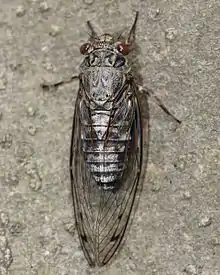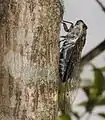| Meimuna opalifera | |
|---|---|
 | |
| Male in Aichi Prefecture, Japan | |
| Song of a Meimuna opalifera recorded in Kawasaki, Japan, on September 18, 2011 | |
| Scientific classification | |
| Kingdom: | |
| Phylum: | |
| Class: | |
| Family: | |
| Tribe: | Cerocomini |
| Genus: | Meimuna |
| Species: | M. opalifera |
| Binomial name | |
| Meimuna opalifera Walker, 1850 | |
Meimuna opalifera known in Japan as tsuku-tsuku-bōshi (ツクツクボウシ) due to its song, is a cicada. In Japan, it emerges in July and is no longer seen by about October.
Distribution
Meimuna opalifera is found in China, Japan, the Korean Peninsula, and Taiwan.[1]
Description
Male Meimuna opalifera grow to a size of about 42 to 46 mm, while females reach a size of about 40 to 44 mm.[2]
 Male in Shiga Prefecture, Japan
Male in Shiga Prefecture, Japan Meimuna opalifera being eaten by a giant Asian mantis (Hierodula patellifera)
Meimuna opalifera being eaten by a giant Asian mantis (Hierodula patellifera).jpg.webp) Female in Fukui Prefecture, Japan
Female in Fukui Prefecture, Japan
Life cycle
Their median life cycle from egg to natural adult death is around two years. However, their life cycle can range from two years to five years.[3]
References
- ↑ "Meimuna opalifera".
- ↑ "Meimuna opalifera".
- ↑ Campbell, Matthew (18 August 2015). "Genome expansion via lineage splitting and genome reduction in the cicada endosymbiont Hodgkinia - Supporting Information" (PDF). Proceedings of the National Academy of Sciences of the United States of America. 112 (33): 10192–10199. doi:10.1073/pnas.1421386112. PMC 4547289. PMID 26286984. Retrieved 13 October 2020.
- "UniProt". Retrieved 2 January 2017.
External links
- "EOL (Encyclopedia of Life)". Retrieved 2 January 2017.
- "Dmitriev (Species File)". Retrieved 2 January 2017.
- "iNaturalist". Retrieved 2 January 2017.
Wikimedia Commons has media related to Meimuna opalifera.
This article is issued from Wikipedia. The text is licensed under Creative Commons - Attribution - Sharealike. Additional terms may apply for the media files.